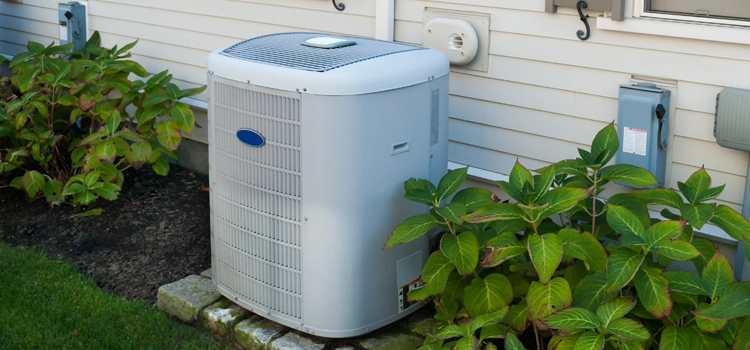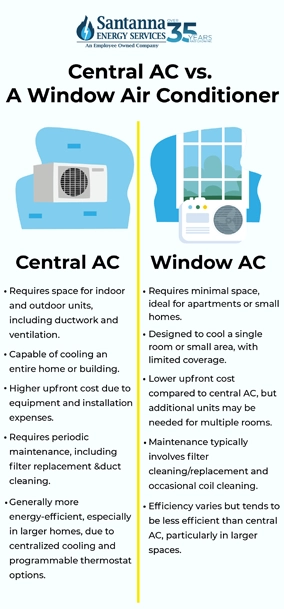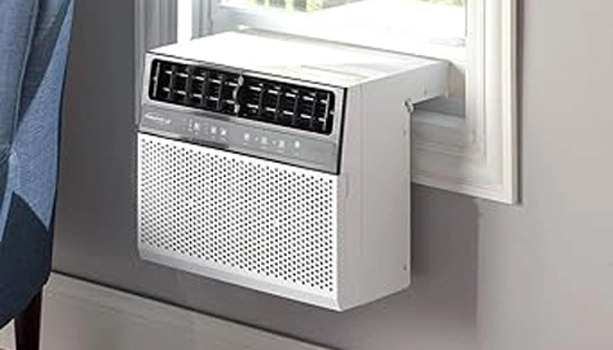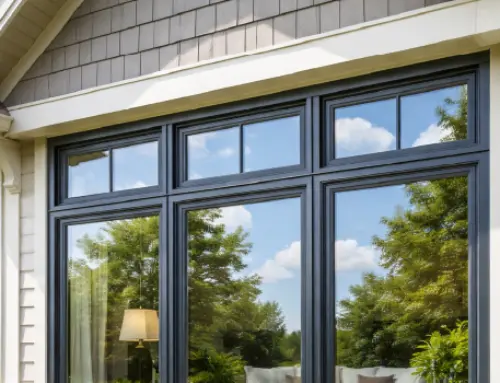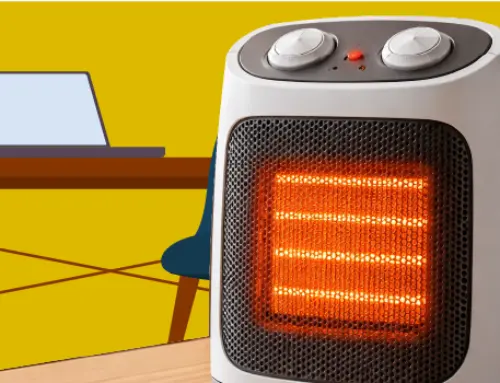Does My Air Conditioner Use Gas or Electricity?
by Tyler Castle
9.9 min read
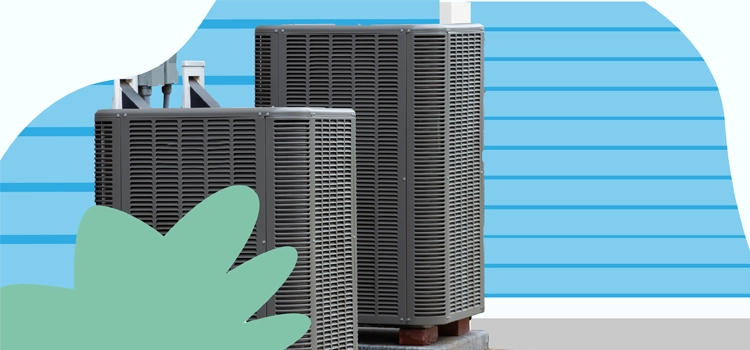
Navigating the realm of home appliances can sometimes feel like deciphering a complex puzzle. Especially when it involves understanding your heating and cooling needs. People commonly ask, Is my air conditioner gas or electric?
We’ve created a guide to help you answer these burning questions. Read on to discover how you can learn everything you need to know about your air conditioner.
Key Points of This Article:
- Electric air conditioners cool indoor air by cycling refrigerant through the compressor, condenser, and evaporator.
- Most air conditioners run on electricity, while gas-powered models are rare and mainly found in older systems.
- Homeowners can identify whether their unit is gas or electric by checking the power source, outdoor unit, manual, or consulting a technician.
- Window air conditioners use less electricity than central AC units, and understanding wattage and usage helps estimate energy costs.
How does an air conditioner work?
Before we dive into your most frequently asked questions, let’s dissect how an electric air conditioner works:
- Your air conditioner cools down the indoor air by using a cooling liquid called refrigerant. This liquid turns into a low-pressure gas in the compressor of the HVAC system.
- Next, the compressor compresses the molecules, and the liquid’s temperature and pressure rise. The hot gas then exits the compressor and moves into the condenser.
- Because of the high pressure of the metal fins spinning from your air conditioner, the gas transforms into a liquid.
- Finally, when the fluid leaves the condenser, the liquid is already pretty cool. The cooled fluid then flows into the evaporator and the pressure within the liquid declines.
- As warm indoor air is blown over the evaporator coil by a fan, the refrigerant absorbs heat from the air, causing it to evaporate into a low-pressure gas again. This process cools the indoor air, which is then circulated back into the living space.
Then the gas is pushed back into the compressor and the process repeats again. By continuing this cycle, over and over, the warm air in the living space diminishes. Leaving the refrigerant (cooled) air to maintain a comfortable indoor temperature.
Do air conditioners use gas?
Air conditioners don’t use gas as their primary energy source. Almost all air conditioners use electricity to power various components in the cooling process. While it’s extremely uncommon, some older models may utilize gas as a supplementary energy source.
Air conditioner vs. air conditioning
The term “air conditioner” typically refers to a unit that performs the act of cooling the air in a specific area or room. This could be a window unit, a split-system unit, or a portable air conditioner, among others. Most homes have the most common type of air conditioning system, central AC.
On the other hand, “air conditioning” refers to the actual process of cooling the air and controlling the temperature. This can involve a centralized system that cools and circulates air throughout an entire building or home, rather than just a single room. Air conditioning systems often include components such as ductwork, thermostats, and filters.
Central Air vs. Central AC
Sometimes the terms “central air” and “central AC” can refer to different aspects of the cooling process.
“Central air” typically refers to the system that provides both heating and cooling to an entire building or home through a central unit. Depending on your home, AC units usually consist of a furnace or heat pump. Central air may be powered by electricity, gas, and/or fuel oil depending on your system.
“Central AC” on the other hand, specifically refers to the cooling component of a central air system. It refers to the air conditioning part of the central HVAC. Central AC systems typically consist of an outdoor compressor unit and an indoor evaporator coil.
How to tell if your air conditioner is gas or electric
According to the E.I.A., 88% of U.S. households use air conditioning. And two-thirds of U.S. households use central AC or central heat pumps as their main AC unit. It’s important to know which unit you have in your home so you can stay energy efficient and don’t risk paying more for your energy. Here’s how to tell if your air conditioner is gas or electric:
Check the Power Source:
Look at the power source of your air conditioning unit. If it’s connected to an electrical outlet or wired directly into your home’s electrical system, it’s likely an electric air conditioner. If it connects to your gas line, it’s a gas air conditioner.
Inspect the Outdoor Unit:
Take a look at the outdoor unit of your air conditioner. If you see a large fan and no visible gas lines or connections, it’s likely an electric unit.
Consult the Owner’s Manual:
If you have the owner’s manual for your air conditioner, it may provide information about the type of energy it uses. Check the manual for details on power requirements and energy sources.
Professional Inspection:
If you’re still unsure about the type of energy your air conditioner uses, consider hiring a qualified HVAC technician to inspect the unit. They can examine the system and provide accurate information about its energy source and operation.
To learn if your heating system is gas or electric, visit our blog here for the complete guide!
Natural gas air conditioners
If you’re looking for an alternative way to cool your home, natural gas air conditioners do exist as an option. Natural gas air conditioning declined in 1990 with only 5 percent of all air conditioners being fueled by natural gas.
Even though natural gas air conditioners have lost popularity, those who still own natural gas models could enjoy reduced electrical demand and lower operating costs in the summer. While these units are available, natural gas air conditioners have higher upfront costs, higher maintenance costs, and can have higher operational costs because of fluctuating gas prices.
Do window air conditioners use a lot of electricity?
If you don’t have a central air conditioner, a window air conditioner can be a good choice for you! Compared to a central AC unit, window units don’t use nearly as much electricity. This is because an AC unit is specifically built to cool homes and large rooms, while a window AC is used for smaller spaces.
How much electricity does a window air conditioner use?
A window AC unit requires on average 400 to 1,400 watts to run. To learn exactly how much electricity your window air conditioner uses, it’ll require a little math. Watts is the standard measurement rate of energy consumption, with one kilowatt (kW) equaling 1,000 watts.
Using the same method we used to calculate the cost and energy consumption of a space heater, let’s figure it out:
- Divide the wattage by 1,000 — which for our example is 1,400 / 1,000 = 1.5 kWh. (A kilowatt-hour is the unit of measurement your energy provider uses to measure your energy consumption.)
2. Multiply that number by the hours of use you’ll use your AC unit. For this example, let’s use 12 hours as the maximum.
- 1.4 kWh x 4 hours = 5.6 kWh
- 1.4 kWh x 6 hours = 8.4 kWh
- 1.4 kWh x 8 hour = 11.2 kWh
- 1.4 kWh x 12 hours = 16.8 kWh
3. To determine your weekly, monthly, and annual energy use, take your estimated daily kWh usage and multiply it by the number of days you run your AC per week, per month, and per year. For our calculations, let’s assume the space heater is on for 6 hours a day and is in use from May to the end of August:
- 6 kWh x 7 days = 42 kWh
- 6 kWh x 30 days = 180 kWh
- 6 kWh x 120 days = 720 kWh
How much will it cost to run a window air conditioner?
Once you know your window AC’s kWh average for a span of time, you’ll need to multiply that value by the kWh usage rate charged by your utility company.
For example, at the U.S. average cost of 16.21 cents per KwH, it would cost an average of $39.02 a month — so around $117.06 for the summer months — to run a 1,400-watt window air conditioning unit for six hours a day. Of course, you don’t have to run your window AC unit at max capacity, and running it at lower settings can help you reduce electricity costs.
Signs your HVAC system needs to be repaired
Air conditioners use about 6% of all the electricity produced in the United States. It’s important to keep an eye on your unit and look for signs that your unit needs to be replaced. An old AC unit can make your system work harder than it needs to and can result in higher energy bills.
Here are a few signs your AC might need to be repaired:
- If you notice weak airflow coming from your vents, it could indicate a problem with the blower motor, ductwork, or air filter.
- Unusual sounds such as banging, rattling, or squealing coming from your HVAC system could indicate loose or damaged components.
- If some rooms in your home are significantly warmer or cooler than others, it could signal issues with your unit.
- If your HVAC system turns on and off frequently (short cycling), it could be a sign of an underlying issue.
- Foul or musty odors emanating from your vents could indicate mold growth or a clogged drain line.
- Any visible leaks or moisture around your HVAC system, such as water pooling near the unit should be addressed promptly to prevent further damage.
- Ice forming on the evaporator coil or refrigerant lines can indicate issues with airflow or refrigerant levels.
What to look for when buying a new HVAC system
When buying a new HVAC system, consider the following factors to ensure you choose the right one for your home:
- Ensure the HVAC system is properly sized for your home. An oversized system can lead to inefficiency and higher energy bills.
- Look for HVAC systems with high energy efficiency ratings or a unit that’s ENERGY STAR certified that can help your home be more energy efficient.
- Consider additional features such as programmable thermostats, zoning systems, and variable-speed motors. These features can enhance comfort, improve energy efficiency, and provide more precise temperature control.
- Installation Requirements: Ensure that the HVAC system you choose can be installed easily and safely in your home. Consider factors such as ductwork compatibility, ventilation requirements, and any necessary modifications to your existing system.
HVAC maintenance tips
- Replace or clean air filters every 1-3 months, or as recommended by the manufacturer. Clogged filters restrict airflow, reduce efficiency, and can lead to increased energy consumption and system wear.
- Ensure air vents and registers are clean and unobstructed to promote proper airflow.
- Check and adjust thermostat settings seasonally to optimize comfort and energy efficiency. Consider upgrading to a programmable or smart thermostat for automated temperature control and energy savings.
- Arrange for annual or bi-annual HVAC maintenance by a qualified technician. Professional tune-ups can identify and address minor issues before they escalate.
- Inspect the condensate drain line for clogs or blockages, and clear any buildup to prevent water damage and mold growth.
- Inspect Ductwork: Periodically inspect ductwork for leaks, gaps, or damage that could compromise efficiency and indoor air quality.
Navigating the complexities of home appliances, particularly understanding heating and cooling systems, can often feel daunting. We hope we made the process of understanding your AC unit much easier!
There’s peace of mind in knowing you’ll pay the same monthly amount for your electricity or natural gas supply without any uncertainty — no matter what. Santanna’s Unlimited Energy option protects your bills from fluctuating supply charges no matter the changes in seasons. For over 35 years, Santanna has served customers in Illinois, Indiana, Pennsylvania, Michigan, and Ohio. Our mission is to provide innovative and cost-effective energy solutions that will help our customers achieve their energy goals.
Tyler is an experienced energy professional, having worked for Santanna Energy Services, for the past four years. He is passionate about renewable energy and believes that diversifying the energy grid is the key to a sustainable future. Tyler is dedicated to supplying consumers with the best possible energy solutions and works diligently to make sure that Santanna can deliver the highest quality service.


